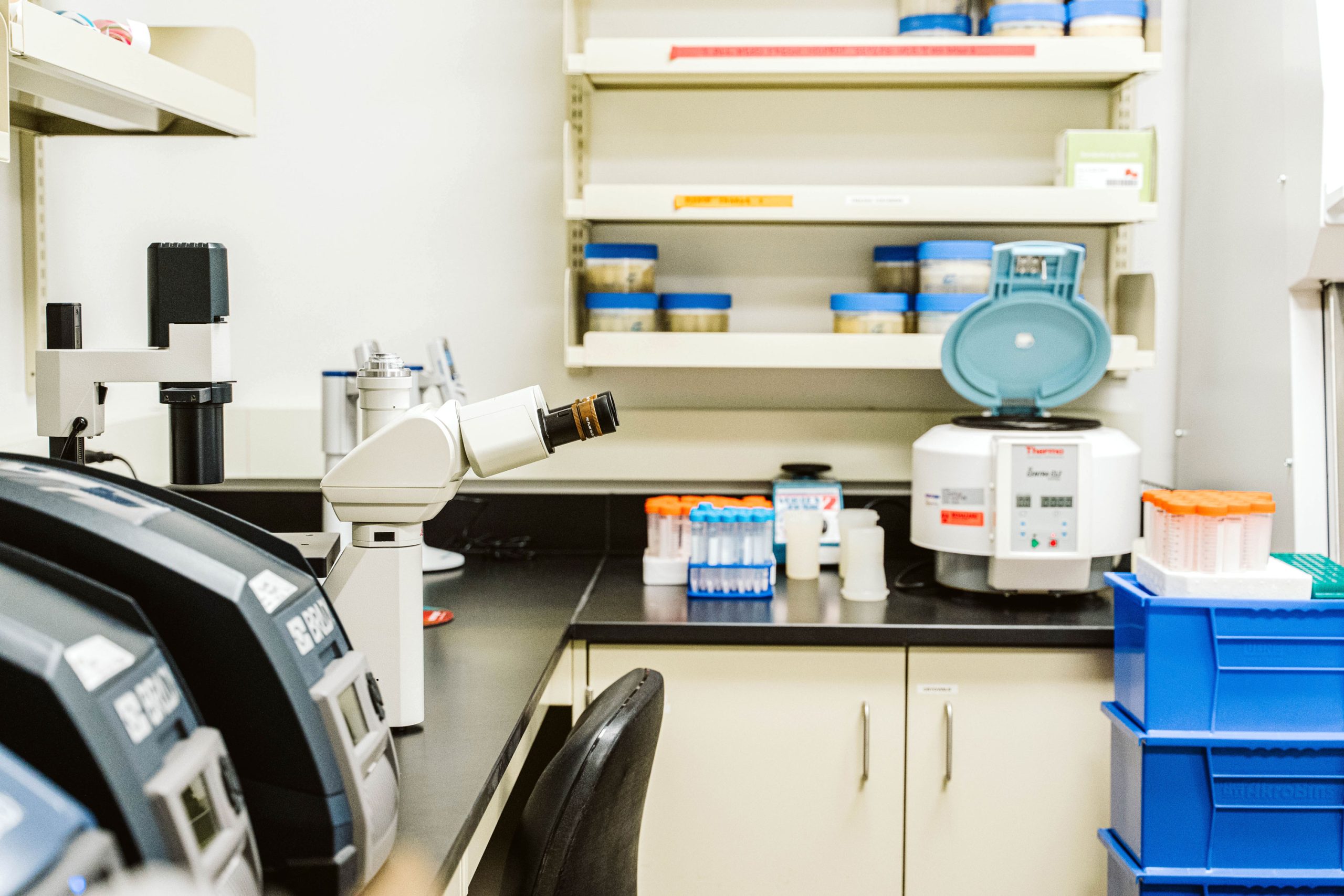Your Trusted Lab for Quality Testing
With over 25 years of experience in stem cell biology, WiCell’s Characterization Laboratory is a trusted partner in advancing your research. Our clinically-certified analysis team delivers unparalleled expertise, ensuring your project benefits from rigorous quality control, rapid turnaround times, and competitive pricing. Whether you’re conducting single-sample tests for publication or managing long-term, multi-sample projects, our services are tailored to meet your specific needs with precision and reliability.
We offer a comprehensive suite of cell characterization and cytogenetic testing services, including:
- G-Banded Karyotype: Our high-resolution G-banded karyotype analysis provides a detailed overview of chromosomal composition, delivering publication-ready results with the accuracy your research demands. Available as non-cGMP or cGMP.
- Fluorescence In Situ Hybridization (FISH): WiCell’s FISH assays precisely localize specific DNA sequences on chromosomes, ideal for detecting targeted chromosomal abnormalities or aneusomies. Available as non-cGMP or cGMP.
- Short Tandem Repeat Analysis (STR): Ensure the authenticity of your cell lines with STR analysis, which identifies and verifies the length of short, repetitive DNA sequences. Available as non-cGMP or cGMP.
- Single Nucleotide Polymorphism (SNP) Microarray: Our SNP microarray offers genome-wide analysis to detect genetic variations that could impact cell line integrity, helping to identify potential risks of genomic instability.
- Undifferentiated Status by Flow Cytometry: Confirm the quality of your stem cell cultures with our flow cytometry–based undifferentiated status assay, detecting key surface markers to ensure cells maintain their pluripotent state.
- Pluripotency by Flow Cytometry: Validate the full potential of your stem cells with WiCell’s pluripotency flow cytometry assay, measuring expression of multiple markers to confirm cells retain the ability to differentiate into all three germ layers.
- Oncopanel Variant Assessment: Evaluate the genomic stability of human pluripotent stem cell lines with WiCell’s targeted Oncopanel Variant Assessment. Available as whole genome or whole exome sequencing. Results provide insight into variants that could impact differentiation potential, research reproducibility, or downstream translational use.
- Mycoplasma Detection by PCR: Protect your valuable cell cultures with our sensitive PCR-based mycoplasma detection assay, designed to safeguard the integrity of your research.
For projects requiring the highest level of rigor, WiCell offers cGMP-compliant services, including cGMP Karyotype, FISH, and STR testing, adhering to the strictest quality standards and regulations. Visit our cGMP Testing Services page to learn more about how our cGMP-compliant characterization services can support your research as it advances toward clinical application.
What is Cytogenetics?
Cytogenetics is the study of chromosome morphology, structure, pathology, function, and behavior. Chromosomes are most effectively studied during mitotic or meiotic metaphase, although certain methods, such as fluorescence in situ hybridization (FISH), can be performed on interphase cells as well. Metaphase chromosomes can be observed in naturally dividing tissues or in cells that have been stimulated to divide in culture.
To study these cells, mitotic arresting agents are used to capture cells in metaphase, followed by a harvesting process. Typically, cells are processed in suspension, although some may be harvested directly on the cultured cells in situ. During harvesting, hypotonic solutions are employed to swell the cells, spreading the chromosomes for easier examination, and methanol-acetic acid is used to fix and preserve them. Prepared slides are then stained, observed, and analyzed. With advancements in technology, computer-generated images are now used to arrange chromosomes into karyograms for detailed study.
The field of cytogenetics has evolved into cytogenomics, incorporating molecular techniques to explore both the complete set of chromosomes and specific regions within them. These tools range from traditional G-banded chromosome analysis to molecular probes like FISH and chromosome microarray analysis, which can highlight regions as small as a single genetic sequence, offering a comprehensive view of chromosomal integrity and anomalies.
What is Cell Line Identity?
Cell line identity verification is essential for ensuring the integrity and reliability of cell-based research. Misidentified or cross-contaminated cell lines can lead to erroneous results and undermine the validity of an entire study. To prevent such issues, cell line identity testing involves confirming that the cells being used are what they are claimed to be, through precise genetic analysis.
One of the primary methods for verifying cell line identity is Short Tandem Repeat (STR) analysis. STR analysis examines specific regions of DNA that vary between individuals, providing a genetic fingerprint unique to each cell line. This process ensures that the cells in use are authentic and free from contamination, which is crucial not only for research accuracy but also for meeting the rigorous standards required for publication and regulatory approval. By confirming the identity of your cell lines, WiCell helps you maintain the integrity and reliability of your research, giving you confidence in the foundation of your work.
Why Choose WiCell?
At WiCell, our commitment to quality and our deep expertise in stem cell biology set us apart. We understand the unique demands of each research project and provide flexible, tailored services from initial inquiry to the delivery of results. Our extensive experience ensures that you receive accurate, reliable data, delivered promptly to support your research timeline. We also know the importance of impactful presentation, which is why we provide publication-ready images to enhance the visibility of your findings. With WiCell, you benefit from a partner dedicated to your success.
